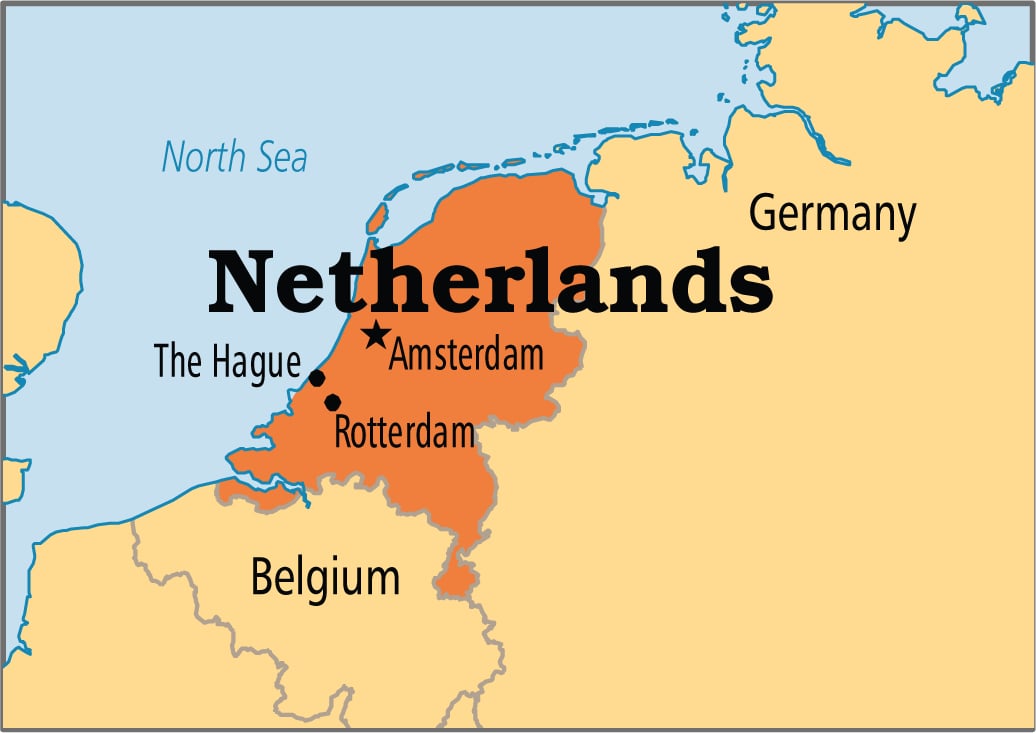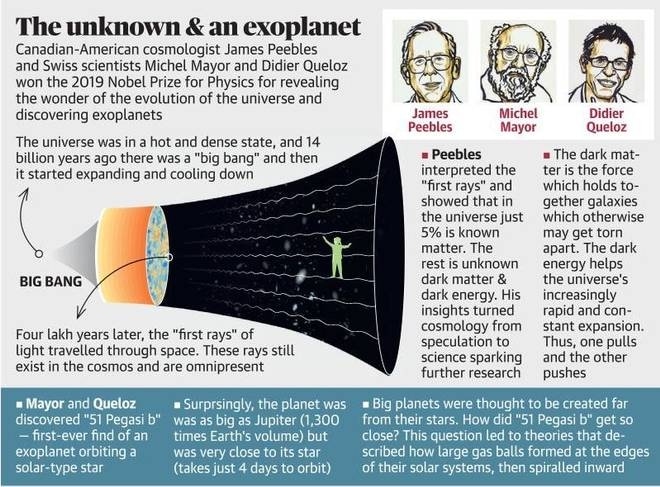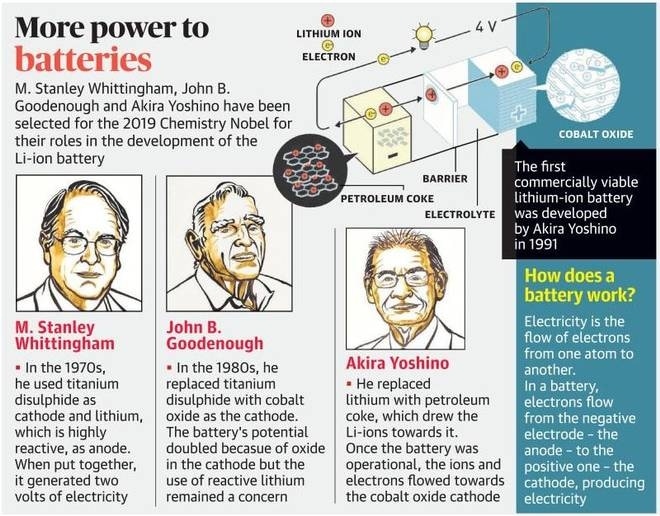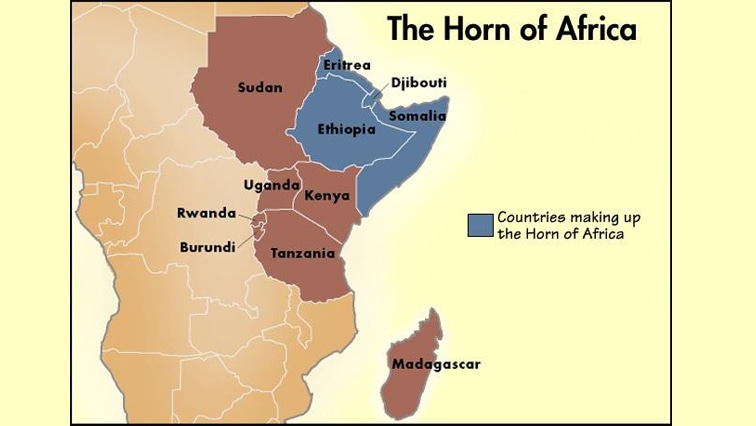Science & Technology
Nobel Prizes 2019
The Nobel Foundation has declared the complete list of winners for 2019.
| Field | Winners | Work Recognized |
| Physics | James Peebles | Theoretical discoveries in physical cosmology |
|
Michel Mayor |
Discovery of an exoplanet “ 51 Pegasi b” orbiting a solar-type star. | |
| Chemistry | John B Goodenough, M Stanley Whittingham, Akira Yoshino |
Development of lithium-ion batteries. |
| Physiology/ Medicine | William G. Kaelin Jr, Sir Peter J. Ratcliffe, Gregg L. Semenza |
For discoveries on how cells sense and adapt to oxygen availability |
| Economic Sciences | Abhijit Banerjee, Esther Duflo, Michael Kremer |
For the experimental approach to alleviating global poverty. |
| Literature | Peter Handke - 2019 |
For an influential work that with linguistic ingenuity has explored the periphery and the specificity of human experience. |
| Olga Tokarczuk - 2018 | For a narrative imagination that with encyclopedic passion represents the crossing of boundaries as a form of life. | |
| Peace | Abiy Ahmed Ali (Prime Minister of Ethiopia) |
For an initiative to resolve the border conflict with neighboring Eritrea. |
About Nobel Prizes
- The will of the Swedish scientist Alfred Nobel established the five Nobel prizes in 1895.
- The Nobel Prizes are a set of recognition given to fields of Chemistry, Literature, Peace, Physics, and Physiology or Medicine by The Nobel Foundation.
- The Nobel Foundation is a private institution established in 1900, has ultimate responsibility for fulfilling the intentions in Alfred Nobel’s will.
- The prizes in Chemistry, Literature, Peace, Physics, and Physiology or Medicine were first awarded in 1901.
Who selects the Nobel Laureates?
- In his last will and testament, Alfred Nobel specifically designated the institutions responsible for the prizes he wished to be established:
- The Royal Swedish Academy of Sciences for the Nobel Prize in Physics and Chemistry,
- Karolinska Institutet for the Nobel Prize in Physiology or Medicine,
- The Swedish Academy for the Nobel Prize in Literature, and
- A Committee of five persons to be elected by the Norwegian Parliament (Storting) for the Nobel Peace Prize.
- In 1968, Sveriges Riksbank established the Sveriges Riksbank Prize in Economic Sciences in Memory of Alfred Nobel.
- The Royal Swedish Academy of Sciences was given the task to select the Laureates in Economic Sciences starting in 1969.
- While the five Nobel Prizes are based on a fund set up from the wealth bequeathed by Alfred Nobel, the Economic Prize is based on a donation received by the Nobel Foundation in 1968 from Sveriges Riksbank.
Science & Technology
Nobel Prize in Physics 2019
The Nobel Prize for Physics has been awarded to James Peebles for theoretical discoveries in physical cosmology, and Michel Mayor and Didier Queloz for discovering an exoplanet orbiting a solar-type star.
- James Peebles: Theoretical discoveries in physical cosmology
- Peebles developed a theoretical framework about the cosmos and its billions of galaxies and galaxy clusters since the mid-1960s.
- The importance of the cosmic radiation during birth of the Big Bang was realized by him.
- James Peebles also interpreted traces from the infancy of the universe and discovered new physical processes.
- The results showed a universe whose just five percent of content is known, the matter which constitutes stars, planets, trees – and us. The rest, 95 per cent, is unknown dark matter and dark energy.
- This is a mystery and a challenge to modern physics.
- Michel Mayor and Didier Queloz : Discovery of an exoplanet orbiting a solar-type star.
- It was the first discovery of an exoplanet (a planet outside our solar system, orbiting a solar-type star in our home galaxy, the Milky Way).
- The discovery of exoplanet 51 Pegasi b, started a “revolution in astronomy”.
- 51 Pegasi b is a gaseous ball comparable with Jupiter.
- Ever since 4,000 exoplanets have been found in the Milky Way Galaxy.
Science & Technology
Nobel Prize in Chemistry 2019
The 2019 Nobel Prize in Chemistry has been jointly awarded to John B Goodenough, M Stanley Whittingham and Akira Yoshino for the development of lithium-ion batteries.
- Through their work, this year’s Chemistry Laureates have laid the foundation of a wireless, fossil fuel-free society.
- In the early 1970s, Dr. Whittingham developed the first functional lithium battery.
- Dr. Goodenough doubled the lithium battery’s potential, creating the right conditions for a vastly more powerful and useful battery.
- Dr. Yoshino succeeded in eliminating pure lithium from the battery, instead basing it wholly on lithium ions, which are safer than pure lithium. This made the battery workable in practice.
- The result was a lightweight, hardwearing battery that could be charged hundreds of times before its performance deteriorated.
- The advantage of lithium-ion batteries is that they are not based upon chemical reactions that break down the electrodes, but upon lithium ions flowing back and forth between the anode and cathode.
- The lithium-ion batteries have reshaped energy storage and transformed cars, mobile phones and many other devices in an increasingly portable and electronic world.
Important Facts For Prelims
Nobel Prize in Physiology/ Medicine 2019
The Nobel Prize in Physiology or Medicine for 2019 was jointly awarded to William G. Kaelin, Sir Peter J. Ratcliffe, and Gregg L. Semenza, for ‘their discoveries on how cells sense and adapt to oxygen availability.’
- The discovery by scientists aims to identify the molecular machinery that regulates the activity of genes in response to varying levels of oxygen and understand how underlying cells adapt to such variations in oxygen supply.
- Gregg L. Semenza was awarded the Prize for the discovery of hypoxia-inducible factor 1 (HIF-1) protein.
- This protein is responsible for switching genes on and off in response to low oxygen levels in the cells.
- Sir Peter J. Ratcliffe (Professor at Oxford University), earned his share of the Prize for discovering a mechanism common to all cells of the human body.
- When oxygen levels are low in the cells, this mechanism signals the kidneys to produce more red blood cells, which carry the vital molecule throughout the body.
- William G. Kaelin (Professor at Harvard University) received the Prize for his work investigating a genetic syndrome called Von Hippel-Lindau’s (VHL) disease.
- He found that the gene behind VHL encodes for a protein that seems to prevent cancer, and was implicated in its response to low oxygen levels.
- This discovery was eventually tied to HIF-1 and gave potential understanding to treat a range of conditions like cancer, diabetes, and coronary artery disease.
- The scientists focused on developing drugs that could treat diseases by either activating or blocking the body’s oxygen-sensing machinery.
- For example, the oxygen response is confiscated by cancer cells which stimulates the formation of blood vessels to help themselves grow.
- This work by scientists has paved the way for new strategies to fight anemia, cancer, and other diseases.
Important Facts For Prelims
Nobel Prize in Economic Sciences 2019
The Sveriges Riksbank Prize in Economic Sciences for 2019 was jointly awarded to Abhijit Banerjee, Esther Duflo, and Michael Kremer, for ‘their experimental approach to alleviating global poverty.’
- This year’s laureates have introduced a new approach to obtain reliable answers about the best ways to fight global poverty. Their approach divides the larger issue into smaller ones that could be easily examined to find out the solution to the problem.
- The three adopted an evidence-based approach to apply their theory to real-life situations using randomized trials and then assessing the outcomes.
- For instance, they found that in India, despite immunization being free, women were not bringing in their children for the vaccination shot. The two economists Abhijit Banerjee & Esther Duflo decided to give them a bag of pulses free to women who brought their babies for vaccination. This freebie policy soon spread and the rate of immunization shot up in the region.
- The field-work based approach that these economists have presented has revolutionized the field of development economics and made it more relevant in policymaking.
- In this way, the experiment-based approach of the three laureates has transformed the developmental economics and turned it into a flourishing field of research.
- The trio’s experimental research methods have benefited more than five million Indian children, who are part of remedial tutoring programmes in schools.
- Esther Duflo has become the second woman to win the prize after Elinor Ostrom of the USA (in 2009). She is also the youngest ever to win the prize.
Important Facts For Prelims
Nobel Prize in Literature 2019
Austrian writer Peter Handke bagged the 2019 Nobel Prize for Literature, and Polish author Olga Tokarczuk was named the winner for 2018.
- Last year, the Swedish Academy (Stockholm), which awards the annual Nobel Prize for Literature, called off the ceremony owing to allegations of sexual misconduct within the Academy.
- Handke was awarded “for an influential work that with linguistic ingenuity has explored the periphery and the specificity of human experience”.
- The choice of Handke has created a controversy for his alleged allegiance to Serbain nationalist sentiments and his sympathies for former Serbian resident Slobodan Milošević, whom more than one international agencies held responsible for the Bosnian genocide in which more than 8,000 people were murdered.
- This whole issue has triggered the age-old question of whether a writer should be judged for his works he represents or his personal biases and political leanings.
- Olga Tokarczuk was awarded “for a narrative imagination that with encyclopedic passion represents the crossing of boundaries as a form of life”.
- She is only the 15th woman to win the Nobel literature prize since 1901.
International Relations
Nobel Prize for Peace 2019
The Nobel Peace Prize for 2019 has been awarded to Abiy Ahmed Ali, the Prime Minister of Ethiopia for his decisive initiative to resolve the border conflict with neighboring Eritrea.
- Abiy Ahmed Ali, the Prime Minister of Ethiopia ended 20 years war with neighboring Eritrea.
- The two countries resumed trade, diplomatic, and travel ties and started “a new era of peace and friendship” in the war-bloodied Horn of Africa.
Historical Background of the Ethiopia-Eritrea conflict
- In 1993, Eritrea broke from its federation with Ethiopia, becoming an independent country that was located strategically at the mouth of the Red Sea on the Horn of Africa.
- Independence was the outcome of a 30-year war by Eritrean liberation fighters against Ethiopia, which had annexed the small multiethnic territory to its north in 1962.
- Just over five years after Independence, however, war broke out between the two countries over the control of Badme — a border town of no apparent significance.
- As the conflict evolved into a major refugee crisis, thousands of Eritreans fled to Europe.
- In June 2000, the two countries signed an Agreement on the Cessation of Hostilities, followed by a Peace Agreement.
- The above agreement formally ended the war and established a Boundary Commission to settle the dispute.
- The Commission gave its “final and binding” ruling in 2002 and Badme was awarded to Eritrea.
- However, Ethiopia refused to accept the decision and the border issues kept erupting in clashes.
- The Prime Minister Abiy Ahmed broke the nearly two-decade stalemate, announcing that Ethiopia would abide by the full terms of the 2000 agreement.
Peace between Ethiopia-Eritrea
- Ethiopia is landlocked, and through the years of the war with Eritrea, had been dependent heavily on Djibouti for access to the Gulf of Aden and onward to the Arabian Sea.
- The peace deal with Eritrea opened up Eritrean ports for Ethiopian use to balance its reliance on Djibouti.
- On the other hand, Eritrea sank steadily into economic stagnation and social and diplomatic isolation due to continuous war with Ethiopia.
- Eritrea also faced accusations from the UN Human Rights Commission for repeatedly human rights violations in the country.
International Relations
India-Netherlands
Recently, the King and Queen of the Kingdom of Netherlands visited India to give an impetus to the bilateral ties shared by the two nations.
Key Highlights
- Economic partnership between India & Netherlands is a key pillar of the bilateral ties.
- The Netherlands is India’s 4th largest trading partner in the European Union. And is also one of the leading investor nation in India.
- The Dutch companies (in India) have a global name in the fields of agriculture, water management, port development, waste management, and urban planning.
- Historical Relations: Indo-Dutch relations can be traced back to more than 400 years when the first Dutch EIC got established in India (in around 17th century AD).
- The official relations between the two nations were established in the year 1947 which, since then, have been cordial and friendly.
- The two countries also share common ideals of democracy, pluralism and the rule of law.
- Cultural Relations: The Netherlands currently is home to the largest Indian community on the European mainland. The growing Indian student and professional community in the Netherlands is making the cultural knot stronger and the technological partnership deeper.
- Significance of Netherlands to India:
- Netherlands’ has supported India’s membership to the different Export Control Regimes and India’s claim to a permanent seat in the UN Security Council.
- India and the Netherlands share common concerns with regard to contemporary challenges that include climate action, cyber-security, and terrorism.
- Smart Cities, green energy, start-ups, smart solutions, and new-age products are bringing the two nations closer. India is keen to share and learn from the Netherlands on the river rejuvenation.
- LOTUS: During the recent visit, a joint launch of the second phase of the Local Treatment of Urban Sewage Streams for the Healthy Reuse (LOTUS-HR) program was done by the Union Minister for Science & Technology for the treatment of sewage water.
- The project was initiated in July 2017 and aims to manifest a novel holistic waste-water management approach that will produce clean water, which could henceforth be reused for various purposes.
- The LOTUS-HR project is jointly supported by the Department of Biotechnology and the Netherlands Organization for Scientific Research /STW.
- WETLAB: It is a design challenge that is jointly supported by the Department of Biotechnology-Biotechnology Industry Research Assistance Council (DBT-BIRAC) and Netherlands Enterprise Agency.
- It provides a unique learning and networking platform for young professionals and students to think differently for innovative ideas to solve India’s urban water challenges and contribute to cleaning up of India’s rivers.
Important Facts For Prelims
World Standards Day
14 October is celebrated as World Standards Day for paying tribute to the collaborative efforts of thousands of experts worldwide who develop the voluntary technical agreements that are published as International Standards.
- It is being officially celebrated since 1970.
- It is an annual event.
- The theme for 2019 is ‘Video Standards Create a Global Stage’ — about standardizing the video compression technologies as mobile phones and other electronic devices related to video production is estimated to be 80% of all internet traffic by 2020.
- In India, it is celebrated by the Bureau of Indian Standards (BIS).
- BIS also highlighted the road map for ‘One Nation One Standard’ for India.
Bureau of Indian Standards
- BIS is the National Standard Body of India for the harmonious development of the activities of standardization, marking and quality certification of goods.
- BIS has been providing traceability and tangibility benefits to the national economy in a number of ways by:
- Providing safe reliable quality goods.
- Minimizing health hazards to consumers.
- Promoting exports and imports substitute.
- Control over the proliferation of varieties etc through standardization, certification, and testing.







